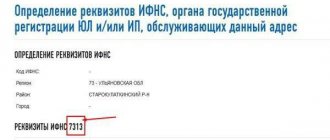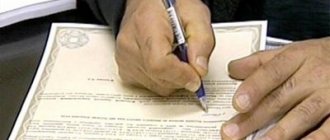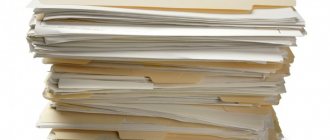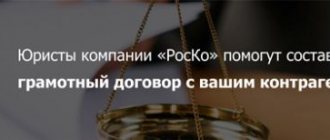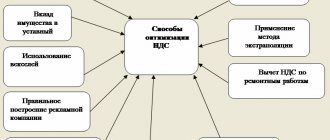What it is
Before considering the main tasks and structure, it is necessary to give a clear definition that will reflect the essence of the work of the desk audit department. This department represents a team of tax employees whose main task and function is to monitor compliance with the tax obligations of enterprises based on the reporting they provide. In general, the main function of the department can be described as the verification of tax reports and documentation.
The peculiarity of the employees of this department is that all the work on analyzing and studying documents takes place in the department of the tax service itself, without visiting taxpayers.
What does the desk audit department do in the tax service?
As already noted, the main function of tax inspectors from the audit department is to analyze and study the financial reports of taxpayers. In addition, the list of responsibilities of department employees includes the following tasks:
- Reception and processing of documentation related to tax calculations and payments.
- Consideration of controversial issues arising in the process of calculating contributions and other payments.
- Initiating audits and sending requests to other tax authorities in order to obtain information about the taxpayer.
- Preparation of the legislative framework for competent registration of violations against unscrupulous citizens.
Department of desk audits in the tax service
Each tax office has a department that deals with desk audits. There may be several such departments, then each has its own direction, for example, desk audits of legal entities, verification of personal income tax declarations, verification of income tax declarations, etc.
A desk tax audit is carried out by authorized officials - tax inspectors, whose main function is to monitor compliance with tax legislation on the basis of reports submitted by taxpayers. “Clerks”, unlike employees of the field inspection department, do not go to the taxpayer, but check all documents on the spot - at the Federal Tax Service.
The main responsibilities of the tax inspector of the desk audit department are as follows:
- acceptance of tax returns, calculations, reports, balance sheets and other documents related to the calculation and payment of taxes and insurance contributions,
- conducting desk audits of received reports and documents,
- conducting counter audits, if necessary - sending requests to other tax inspectorates to conduct such audits,
- consideration of issues of refund of overpayments on taxes, insurance contributions and other payments to the budget,
- collecting evidence on violations of tax laws by taxpayers, preparing materials for applying sanctions to violators, including suspending transactions on bank accounts due to failure to submit tax reports.
In general, we can highlight the following main tasks of the desk tax audit conducted by the department:
- checking received reports,
- based on the results of the audit - selection of taxpayers for an in-depth “camera examination”,
- selection of taxpayers for whom it is possible to schedule an on-site tax audit.
Objects of inspections
Any commercial enterprises and legal entities that receive profit as a result of their activities may be subject to inspections by the office department. It is now quite common practice for only those organizations that are engaged in commercial activities to be inspected.
If necessary, tax inspectors from the office department can begin checking various religious and charitable organizations that do not make a profit.
As a rule, in most cases, only those enterprises and organizations that, in the course of their activities, have already had shortcomings in the matter of taxation are subject to inspection. Also often subject to inspections are those commercial organizations whose tax payments are much lower than payments made by enterprises of the same income level.
The legislative framework
Orders of the Federal Tax Service (FAS) also have supreme force for department employees. All main issues related to the desk department are clearly stated in Article 88 of the Tax Code of the Russian Federation.
In addition to the fact that tax officials rely on already published legislative acts, the office department carefully monitors all changes in legislation. Such monitoring of the legislative framework allows inspectors to carry out their activities with maximum efficiency.
Goals and types
The main task of inspections carried out by employees of the department is to identify violations by taxpayers and individual commercial enterprises. The cameral department is obliged to regulate compliance with tax laws by citizens, as well as to help prevent violations.
If violations are detected, inspectors are required to initiate tax and administrative proceedings. Despite the fact that in most cases the audit is carried out directly at the tax service (in the department), when various shortcomings are identified, employees carry out on-site audits.
- A formal check involves a simple analysis of an enterprise or legal entity for the presence or absence of a specific document. In addition to the fact that during a formal inspection, employees check the availability of reports, they are required to identify shortcomings in their completion and execution.
- Regulatory verification is carried out on the basis of current legislation.
- Arithmetic gap analysis involves checking all numerical indicators in documents.
Department functions
In general, the desk tax service carries out a huge amount of work, which can be divided into several main functions:
- Analysis and verification of documentation.
- Identification of violations.
- Preparation of the legislative framework for initiating an on-site inspection.
- Creation and updating of a single database with additional data.
- Personnel retraining.
At the moment, the structure of the department includes employees of the following positions:
- head of a department with a wide range of responsibilities;
- specialists in the field of high technology;
- accountants;
- lawyers;
- economists.
Depending on the specific tax authority, the composition and structure may be reduced, which leads to the fact that one employee performs responsibilities in several areas at once.
In the process of retraining and additional training, tax inspectors gain access to more responsible and difficult tasks, so his work can be characterized as a constant process of identifying legal and tax violations by commercial and non-commercial enterprises.
The employee’s responsibilities also include collecting information and statistics on taxation for the region as a whole.
In addition to the chief inspector, the structure of most office departments includes employees of the following positions: accountant, lawyer, economist. Each employee is obliged to provide assistance and assistance to colleagues in identifying tax violations, as well as contribute to the timely and competent execution of administrative proceedings.
General information on desk tax audits is presented below.
Each division of the Federal Tax Service has a desk audit department. Its tasks include studying the financial activities of the entrepreneur in order to identify violations of current legislative norms. In this article we will talk in detail about what the desk inspection department is, what it does, what inspectors are allowed to do, and what is prohibited.
What does the office inspection department No. 1, No. 2, No. 3, No. 4, No. 5, No. 6 do?
When a taxpayer submits reports, the Federal Tax Service launches a desk audit procedure that checks declarations for completeness and timeliness of taxes paid to the state treasury.
The legislation of the Russian Federation approves about 20 types of taxes, and reporting is provided for each.
A separate service has been formed to process incoming information to the Federal Tax Service. The article will discuss what the desk audit department is, what it does, what responsibilities and powers are assigned to employees.
Let's consider an example of constructing sectors of the office department using the example of Federal Tax Service No. 43, Moscow
The department consists of 6 sectors, each working with a corresponding category of taxpayers.
- Office audit department 1 - responsible for 3-NDFL, 4-NDFL, administers insurance premiums and trading fees for individual entrepreneurs.
- Office audit department 2 – administers VAT issues for organizations, monitors the completeness of payment, the legality of refunds, and the application of the 0% tax rate.
- Department of Desk Inspections 3 – his department is responsible for income tax. Inspectors are also responsible for reporting personal income tax. persons During the audit, they study the composition of taxable income, tax deductions, the procedure for withholding and contributing to the budget, and verify the correctness of the 6-NDFL and 2-NDFL declarations.
- Department of Desk Inspections 4 – deals with issues of the unified social tax, as well as transport land and property tax for both organizations and individuals. Persons
- Department of desk audits 5 - oversees the issues and reporting of organizations working under the simplified simplified tax system and UTII.
- Department of Desk Inspections 6 – deals with debtors and residents who did not submit reports on time. Department employees summarize the results of the audit, communicate with taxpayers, prepare reports, lists of violators for submission to the legal department and the debt settlement department.
There is no single rule for the distribution of functions between sectors. Each inspection branch establishes its own operating procedure, depending on the territory it controls.
In each specific Federal Tax Service, there may be more or fewer subsections of the cameral department. The distribution of categories of taxpayers served by each subsection may also be different.
Source: https://NalogObzor.info/publ/cem-zanimautsa-otdely-kameralnyh-proverok-no1-no2-no3-no4-no5-no6-v-nalogovoi-sluzbe
Definition of the concept
There is no tax office that does not have a desk audit department; what it does can be understood from the name. Enterprises, individual entrepreneurs and legal entities regularly become the object of his close attention. persons who are engaged in commercial activities and are required to pay taxes on time. In rare cases, inspectors may check charities and some other organizations that are not engaged in business activities. Particular attention is paid to those enterprises that are characterized by the following features:
- their tax base is lower than that of similar organizations;
- their statements contain more expenses (deductions) than income;
- They have only losses over several tax periods.
Types of events held
- formal;
- normative;
- arithmetic;
- immediate.
During the formal process, the availability of the necessary documentation and the correctness of its completion are determined. In this case we are talking about tax returns, personal income declarations. persons, documents that become the basis for the calculation and payment of taxes.
At the next stage, it is checked whether the taxpayer has violated the law. Arithmetic is carried out to check whether the payer’s calculations are correct. Next comes the actual check, the essence of which is to study the data provided and determine how true it is.
During a desk audit, the tax inspector has the right to require the taxpayer to provide other documents (except for declarations and financial statements). A complete list of these documents is presented in the Tax Code.
Rights and responsibilities of a tax inspector when conducting a tax (office) audit
Even if more than three months have passed since the submission of the declaration, claims are still possible. Tax officials must conduct a camera examination within three months after submitting the declaration (Clause 2 of Article 88 of the Tax Code). But in practice they often delay verification. It is unlikely that it will be possible to cancel an audit decision just because the tax authorities violated the three-month deadline. This violation is not considered significant (clause 14 of Article 101 of the Tax Code).
But tax officials have the right to request documents and explanations on the declaration within the camera room. If the three-month verification period has passed, then the requests are illegal (clause 27 of the resolution of the Plenum of the Supreme Arbitration Court of July 30, 2013 No. 57). An exception is if the tax authorities have already drawn up an audit report, but then decided to schedule additional measures, this may be a request for documents (clause 6 of Article 101 of the Tax Code).
The tax office may demand a fine of 5,000 rubles. (clause 1 of article 129.1 of the Tax Code). Inspectors do not have the right to demand an explanation when the inspection period has expired, and therefore also to fine for refusal. But you will have to prove this to the inspectors.
Inspectors are suspicious of organizations that do not respond to requirements. They will decide that the company has something to hide, so it is safer to send at least a short answer to the tax authorities.
During a desk audit, inspectors have the right to demand documents only in cases listed in the Tax Code (clause 7 of Article 88).
Cases when inspectors may request documents during a desk inspection
1. Contradictions or discrepancies with the counterparty’s reporting were found in the VAT return. 2. The organization claimed a VAT refund. 3. The company declared a benefit. 4. In the VAT return, deductions were declared for the tax returned to the foreigner as part of tax free, which do not correspond to the data of the tax authorities. 5. A declaration on mineral extraction tax, water or land tax has been submitted. 6. The company did not attach the required documents to the declaration. 7. There are non-taxable amounts or reduced rates in the calculation of contributions. 8. When calculating income tax, the organization applies an investment tax deduction. 9. The company submitted an amendment to reduce tax or increase losses after more than two years had passed from the date of submission of the initial declaration. 10. These declarations do not correspond to other information that the tax authorities have (Resolution of the Presidium of the Supreme Arbitration Court dated March 15, 2012 No. 14951/11).
Inspectors now pay more attention to VAT audits than to other taxes. Buyers have risks if the supplier does not submit a declaration or does not include an invoice in it. Tax officials also find schemes in which the buyer cooperates with a fly-by-night company not directly, but through a chain of resellers.
For other taxes, there are fewer in-depth audits, but declarations with benefits are carefully checked. Regarding income tax, attention is paid to declarations with losses, with minimal profit with large turnover in the current account. They check the statements of those companies that have VAT gaps more carefully. Inspectors believe that such companies may also have income tax violations. Explanations and documents are requested regarding contributions if the company applies reduced rates or pays non-taxable amounts. They compare the tax amounts from 6-NDFL with those actually paid to the budget.
Pay the arrears and penalties before submitting the updated declaration, otherwise the tax office may fine you.
Functions of department employees
- carry out inspections and control activities;
- collect the necessary information about taxpayers;
- take action if errors and omissions are detected;
- carry out analytical work;
- prepare tax notices, certificates, and other documentation;
- calculate taxes;
- respond to requests from taxpayers if these requests are related to the conduct and results of a desk audit;
- In addition, tax inspectors are required to regularly improve their qualifications and take refresher courses.
Control measures affect tax deductions for VAT, the application of minimum rates, and compliance by exporters with legal regulations.
Collecting information about the entrepreneur is necessary in case an on-site inspection is required. Inspectors attach great importance to any information, even down to the amounts that were spent on paying for the electricity consumed.
If they identify shortcomings and errors, all information about the violator is transferred to the debt settlement department.
By analyzing the information received, they try to understand whether the taxpayer tried to avoid paying taxes and reduce the tax base. Based on these data, proposals are made on how to prevent such developments.
Department employees prepare notifications for private entrepreneurs and certificates for exporters, which customs officers require from them.
Their responsibilities include calculating taxes on personal income. persons and transport tax.
Division of the desk audit department by sector
A desk service may have several subsections. The quantity depends on the service territory covered by a specific division of the Federal Tax Service
Each is assigned individual functions, detailed in local management instructions, which are developed and approved by the head of the department, using tax and labor law.
The contents of the instructions for each department look like this:
- Desk inspection department 1, what does it do;
- what is the number of employees;
- Full name of the head;
- detailed job description for each employee, etc.
Let's consider an example of constructing sectors of the office department using the example of Federal Tax Service No. 43, Moscow
The department consists of 6 sectors, each working with a corresponding category of taxpayers.
- Office audit department 1 - responsible for 3-NDFL, 4-NDFL, administers insurance premiums and trading fees for individual entrepreneurs.
- Office audit department 2 – administers VAT issues for organizations, monitors the completeness of payment, the legality of refunds, and the application of the 0% tax rate.
- Department of Desk Inspections 3 – his department is responsible for income tax. Inspectors are also responsible for reporting personal income tax. persons During the audit, they study the composition of taxable income, tax deductions, the procedure for withholding and contributing to the budget, and verify the correctness of the 6-NDFL and 2-NDFL declarations.
- Department of Desk Inspections 4 – deals with issues of the unified social tax, as well as transport land and property tax for both organizations and individuals. Persons
- Department of desk audits 5 - oversees the issues and reporting of organizations working under the simplified simplified tax system and UTII.
- Department of Desk Inspections 6 – deals with debtors and residents who did not submit reports on time. Department employees summarize the results of the audit, communicate with taxpayers, prepare reports, lists of violators for submission to the legal department and the debt settlement department.
There is no single rule for the distribution of functions between sectors. Each inspection branch establishes its own operating procedure, depending on the territory it controls.
In each specific Federal Tax Service, there may be more or fewer subsections of the cameral department. The distribution of categories of taxpayers served by each subsection may also be different.
Functions of the head of the department
The desk department of the tax inspectorate is headed by a director who is vested with great powers. He is obliged to recruit only highly qualified accountants, economists and lawyers to his staff. Moreover, each employee must not only be a good specialist in his or her industry, but also know the rules of tax legislation.
The manager's responsibilities include:
- organizing the work of the entire department;
- interaction with other departments of the department;
- resolving personnel issues;
- drawing up job descriptions;
- control over the actions of subordinates.
Structure of the desk audit department.
The management of the department is structured linearly, orders and instructions are transmitted from a higher superior, who holds complete control in his hands. But he does not have the right to give orders to subordinates bypassing their immediate supervisor.
This is a highly qualified specialist with experience in tax structures. Competent in tax and government issues. An organizer and leader by nature.
- On his shoulders lies the organization of the department, personnel issues, and the development of regulations for each department employee.
- Interacts with regulatory, legislative, judicial authorities and the media.
- Urgently monitors and puts into practice innovations regarding the work of the department.
- Issues final conclusions based on the results of inspections.
- Initiates penalties for violators, including criminal ones.
- Conducts reporting work to the departments of the Federal Tax Service and senior management.
Reports directly to the boss. In his absence, he acts as director.
Must have a good knowledge of regulatory state tax accounting documents, job regulations of subordinates, safety and health standards, methods of working with the media and citizens.
In his department:
- personnel issues;
- public performance;
- participation in legal proceedings;
- participation in making decisions on suspending the movement of funds in the company’s accounts, terminating its activities in cases approved by tax law;
- He is also responsible for storing the department's classified information and for the archive, both in paper and electronic form.
The senior tax inspector heads a separate sector of the office department. There may be several such staffing units, depending on the number of sectors. The employee must have leadership qualities and have an in-depth knowledge of the regulations and legislative framework of the department he manages.
Responsibilities of the Senior Inspector:
- coordinates desk audits;
- collects and analyzes information about the person who filed the declaration;
- communicates with taxpayers regarding violations of desk audits;
- authorized to request in writing updated documents or call witnesses to testify;
- participates in resolving issues regarding offenses, drawing up protocols;
- makes proposals for penalties in case of tax violations;
- analyzes possible tax evasion schemes.
Tax inspectors report to the senior tax inspector. These are employees with higher education who understand the basics of legislative, tax and accounting regulations and have computer skills at the user level.
At workplace inspectors:
- check the correctness of calculation of taxes paid in reporting declarations, based on standards and other reports from the taxpayer;
- based on the results of the reconciliation, they formalize the results, and if successful, enter the information into the electronic database of the Federal Tax Service;
- if errors are detected, they report this to senior inspectors;
- at the direction of management, prepare requests to the legal department and the debt settlement department;
- prepare payment documents, notifications and certificates on demand for organizations and individuals. persons
Features of work
The department of desk audits in the tax service, when performing its functions, is guided by the norms of the current tax legislation: Art. 87, 88, 90, 91, 93, 95, 97, 100 of the Tax Code of the Russian Federation. The specifics of conducting a desk audit are prescribed in Article 88 of the Tax Code of the Russian Federation. Each department employee must be aware of the latest changes in legislation.
So, the desk audit department is a division of the tax inspectorate. Its employees study the documentation provided by the taxpayer, check the accuracy of the information, and suppress any attempts to break the law. They also decide whether to transfer information about the entrepreneur to the debt settlement department or whether to conduct an on-site inspection.
The peculiarity of a desk audit is that it is carried out without a direct visit to the taxpayer, and also that only declarations submitted by taxpayers are studied.
The duration of a desk audit according to the Tax Code is strictly limited. It lasts three months from the date of filing the taxpayer’s declaration, as well as other documents on the basis of which taxes are calculated and paid.
However, in certain cases, the duration of the desk audit may be increased. The list of such reasons is contained in Art. 88 of the Tax Code of the Russian Federation.
If during an audit of a taxpayer, one or another violation of tax legislation is discovered, as well as any discrepancy in the documentation, then in accordance with Article 100 of the Tax Code, a desk audit report is drawn up, in which all identified violations are recorded.
The activities of desk audit departments of tax authorities contribute to filling the federal and local budgets by collecting unpaid taxes and fees, as well as eliminating other identified violations in the tax field.
Timing of desk inspection
A desk tax audit is carried out at the location of the tax office within 3 months from the day the taxpayer submitted the reports, if the inspectors have no comments on the reports.
If violations are detected in the submitted reports, Art. 88 of the Tax Code of the Russian Federation, in addition to the 3 months during which the desk audit is carried out, provides for the following terms:
- 10 working days – to draw up a desk inspection report;
- 5 working days from the date of drawing up the act are given for its delivery to the taxpayer;
- 1 month – the period during which the taxpayer can submit his objections to the audit report;
- another 10 working days are given to the head of the Federal Tax Service to consider the materials of the “office room” and the taxpayer’s objections. On their basis, he makes a decision to hold or refuse to hold the taxpayer accountable for a tax offense. In special cases, if additional tax control measures are required, the period may be extended by another 1 month.
Objects of inspections
Enterprises of various forms of ownership, individual entrepreneurs, as well as legal entities may be subject to desk inspection.
With rare exceptions, only those enterprises that make a profit from their activities are subject to inspection. However, if there are compelling reasons, the desk audit department of the Tax Service can also inspect charities and other organizations that are not engaged in commercial activities.
In accordance with the current regulatory documents, first of all, those enterprises whose taxes collected are below the average level compared to similar enterprises, whose reporting contains a significant number of deductions, and where a loss has been identified over a certain number of adjacent tax periods may be subject to inspection.
Goals and types
The goals of audits carried out by the desk departments of tax authorities are to detect and prevent violations in the field of tax circulation, monitor compliance by taxpayers with tax legislation, impose penalties for detected violations, and bring those responsible for detected offenses to tax or administrative liability.
Also, during desk audits, information is collected and systematized, on the basis of which the tax authority selects taxpayers to conduct on-site audits against them.
There are four types of desk checks:
- formal;
- normative;
- arithmetic;
- immediate.
The purpose of a formal audit is to determine the presence or absence of all necessary reports and documents. In addition to the availability of specific documentation, the correctness of its completion, the absence of unauthorized corrections, and the presence of the necessary signatures are also checked, with mandatory verification of their authenticity.
During a regulatory audit, documents are examined to identify violations of the legislation in force at the time of the audit.
To establish the correctness of the amounts recorded in the documents being examined, an arithmetic check is carried out. Its subject is all digital indicators and arithmetic operations recorded in documents.
Direct verification consists of a logical study of digital indicators, which are the basis for determining by the taxpayer the specific amount of tax contributed to the budget.
Department functions
The desk audit department of the tax service carries out a significant amount of work. The main functions of the department can be divided into the following categories:
- inspection and control activities;
- collection of information about taxpayers;
- taking action against violators of tax laws;
- analytical work;
- preparation of tax notices and certificates;
- tax calculation;
- interaction with other departments of the tax authority;
- responses to taxpayer requests within the competence of the department;
- carrying out work to retrain personnel and improve their qualifications.
The department conducts desk audits of tax returns, income statements of individuals, documents on the basis of which taxes and fees are calculated and paid, the amounts of applied tax rates and deductions, as well as the legality of VAT transactions.
The collection of information about taxpayers and their subsequent selection is carried out in order to form a plan for on-site tax audits. In addition, a fairly large-scale collection and analysis of information about taxpayers obtained from various sources is carried out.
Indicators such as the amount of electricity, water, etc. consumed by the taxpayer enterprise are collected. This information is analyzed, systematized and used to carry out effective control activities.
The department takes measures against violators of tax laws - suspends transactions on their accounts, transfers information about debtors to the debt settlement department.
Analytical work is carried out in the field of studying existing methods of tax evasion. Based on a comprehensive analysis, the department prepares proposals to prevent the operation of these schemes.
The department prepares tax notices for individual entrepreneurs and compiles certificates for taxpayers-exporters, which they need to interact with customs authorities.
He also deals with the calculation of property taxes for individuals and transport taxes.
In its activities, the Department of Desk Inspections interacts with other departments of the tax service - it prepares materials and certificates for them, and transmits the results of inspections.
In addition, feedback is provided to taxpayers in the form of preparing responses to written requests received from them.
The department also takes part in activities to improve the qualifications of tax authorities, their retraining, prepares and conducts seminars and meetings on those issues of the tax service that fall within its competence.
The desk audit department is headed by a chief with a wide range of powers and responsibilities, and is staffed by highly qualified lawyers, accountants, economists and specialists in the field of high technology. In addition to their specialization, all employees are required to have a good level of training in the field of current tax legislation.
The nuances of conducting desk tax audits are presented in this video.
The head manages the current activities of the department, interacts with other departments of the tax service, deals with personnel issues, draws up job descriptions for employees, monitors the employees’ performance of their duties and their compliance with labor regulations, and plans activities.
The chief is personally responsible for the work of the department, compliance with current legislation, and the safety of the property included in the department.
State tax inspectors, in accordance with their specifications, check taxpayers for compliance with tax legislation. Inspections of legal entities and individuals have their own characteristics, and there are also differences between on-site and desk inspections.
In addition, the responsibilities of tax inspectors include monitoring the timely payment of taxes and fees, maintaining tax statistics, and working with violators of tax laws (imposing various sanctions).
What does the field audit department do at the tax office?
When a taxpayer submits reports, the Federal Tax Service launches a desk audit procedure that checks declarations for completeness and timeliness of taxes paid to the state treasury.
The legislation of the Russian Federation approves about 20 types of taxes, and reporting is provided for each.
A separate service has been formed to process incoming information to the Federal Tax Service. The article will discuss what the desk audit department is, what it does, what responsibilities and powers are assigned to employees.
Briefly about the desk audit procedure
Conducted at the location of the tax authority. For this purpose, a desk audit department has been created in the tax service.
The procedure for conducting the inspection is described in Art. 88 Tax Code of the Russian Federation
The object of verification is the completed declaration. In its absence, the service operates with other data about the taxpayer available to the Federal Tax Service.
From January 2020, the inspection period is 2 months. But if errors are identified in the process, the review may be extended to three months by default, without notifying the organization about this.
After the period has passed, if no violations are found, the inspection ends. You can find out about the successful completion of the procedure in the electronic inspection program in the taxpayer’s personal account.
If inconsistencies, errors, or intentional violations are detected, the inspection takes appropriate measures:
- requests an updated document;
- organizes an on-site inspection;
- In case of violation of the law, a temporary ban on the organization’s activities, “freezing” of bank accounts, and initiation of criminal proceedings against the taxpayer are possible.
The inspected resident has the right to disagree with the decision of the Federal Tax Service and appeal it in court.
You can read more in the article Desk tax audit.
What does the cameral service do?
The cameral department is part of the Inspectorate of the Ministry of the Russian Federation for Taxes and Duties of the region to which it is assigned.
The main tasks that the desk department solves are monitoring taxpayers for timely and full payment of taxes and fees to the state budget, in accordance with the rules regulated by the legislation of the Russian Federation.
Taxes in force on the territory of the Russian Federation are paid to state, local and regional budgets.
The following main taxes are currently in effect:
- value added (VAT);
- on the income of individuals (personal income tax);
- at a profit;
- excise taxes;
- unified social (UST);
- National tax;
- other.
- transport (TN);
- on the property of organizations (NI).
- Land;
- on the property of individuals.
An organization can choose the type of tax accounting for itself, depending on the conditions for conducting business:
- simplified system (STS);
- taxation system for producers of agricultural products (UST);
- unified tax on imputed income for certain types of activities (UTII);
- a special system for the implementation of production sharing agreements.
Legislative standards that guide the service in its work:
- Constitution of the Russian Federation;
- tax code of the Russian Federation;
- federal laws and other decrees, orders and acts of the President and Government of the Russian Federation and other legislative authorities;
- other documents.
Structure of the desk audit department
The management of the department is structured linearly, orders and instructions are transmitted from a higher superior, who holds complete control in his hands. But he does not have the right to give orders to subordinates bypassing their immediate supervisor.
Responsibilities of the Chief
This is a highly qualified specialist with experience in tax structures. Competent in tax and government issues. An organizer and leader by nature.
- On his shoulders lies the organization of the department, personnel issues, and the development of regulations for each department employee.
- Interacts with regulatory, legislative, judicial authorities and the media.
- Urgently monitors and puts into practice innovations regarding the work of the department.
- Issues final conclusions based on the results of inspections.
- Initiates penalties for violators, including criminal ones.
- Conducts reporting work to the departments of the Federal Tax Service and senior management.
Responsibilities of the Deputy Chief
Reports directly to the boss. In his absence, he acts as director.
Must have a good knowledge of regulatory state tax accounting documents, job regulations of subordinates, safety and health standards, methods of working with the media and citizens.
In his department:
- personnel issues;
- public performance;
- participation in legal proceedings;
- participation in making decisions on suspending the movement of funds in the company’s accounts, terminating its activities in cases approved by tax law;
- He is also responsible for storing the department's classified information and for the archive, both in paper and electronic form.
Responsibilities of tax inspectors
The senior tax inspector heads a separate sector of the office department. There may be several such staffing units, depending on the number of sectors. The employee must have leadership qualities and have an in-depth knowledge of the regulations and legislative framework of the department he manages.
Responsibilities of the Senior Inspector:
- coordinates desk audits;
- collects and analyzes information about the person who filed the declaration;
- communicates with taxpayers regarding violations of desk audits;
- authorized to request in writing updated documents or call witnesses to testify;
- participates in resolving issues regarding offenses, drawing up protocols;
- makes proposals for penalties in case of tax violations;
- analyzes possible tax evasion schemes.
Tax inspectors report to the senior tax inspector. These are employees with higher education who understand the basics of legislative, tax and accounting regulations and have computer skills at the user level.
At workplace inspectors:
- check the correctness of calculation of taxes paid in reporting declarations, based on standards and other reports from the taxpayer;
- based on the results of the reconciliation, they formalize the results, and if successful, enter the information into the electronic database of the Federal Tax Service;
- if errors are detected, they report this to senior inspectors;
- at the direction of management, prepare requests to the legal department and the debt settlement department;
- prepare payment documents, notifications and certificates on demand for organizations and individuals. persons
Division of the desk audit department by sector
A desk service may have several subsections. The quantity depends on the service territory covered by a specific division of the Federal Tax Service
Each is assigned individual functions, detailed in local management instructions, which are developed and approved by the head of the department, using tax and labor law.
The instructions for each department look like this:
- Desk inspection department 1, what does it do;
- what is the number of employees;
- Full name of the head;
- detailed job description for each employee, etc.
Let's consider an example of constructing sectors of the office department using the example of Federal Tax Service No. 43, Moscow
The department consists of 6 sectors, each working with a corresponding category of taxpayers.
- Office audit department 1 - responsible for 3-NDFL, 4-NDFL, administers insurance premiums and trading fees for individual entrepreneurs.
- Office audit department 2 – administers VAT issues for organizations, monitors the completeness of payment, the legality of refunds, and the application of the 0% tax rate.
- Department of Desk Inspections 3 – his department is responsible for income tax. Inspectors are also responsible for reporting personal income tax. persons During the audit, they study the composition of taxable income, tax deductions, the procedure for withholding and contributing to the budget, and verify the correctness of the 6-NDFL and 2-NDFL declarations.
- Department of Desk Inspections 4 – deals with issues of the unified social tax, as well as transport land and property tax for both organizations and individuals. Persons
- Department of desk audits 5 - oversees the issues and reporting of organizations working under the simplified simplified tax system and UTII.
- Department of Desk Inspections 6 – deals with debtors and residents who did not submit reports on time. Department employees summarize the results of the audit, communicate with taxpayers, prepare reports, lists of violators for submission to the legal department and the debt settlement department.
Source: https://xn--80apfbbighbel2n.xn--p1ai/dokumenty/chem-zanimaetsya-otdel-vyezdnyh-proverok-v-nalogovoj
The legislative framework
The desk audit department of the tax authority in its activities is guided by Articles 87, 88, 90, 91, 93, 95, 97, 100 of the Tax Code, the current Orders of the Federal Tax Service, as well as some provisions of the current federal legislation relating to the field of taxation.
Issues of desk audits are discussed and regulated in more detail in Article 88 of the Tax Code.
It should be noted that tax inspectors are constantly aware of the latest changes in tax legislation, monitor the adoption of new laws and amendments to existing ones. This allows you to carry out inspections with maximum efficiency and avoid errors and violations of the law.
The webinar on desk audits can be viewed below.
Briefly about the desk audit procedure
Conducted at the location of the tax authority. For this purpose, a desk audit department has been created in the tax service.
The procedure for conducting the inspection is described in Art. 88 Tax Code of the Russian Federation
The object of verification is the completed declaration. In its absence, the service operates with other data about the taxpayer available to the Federal Tax Service.
From January 2020, the inspection period is 2 months. But if errors are identified in the process, the review may be extended to three months by default, without notifying the organization about this.
After the period has passed, if no violations are found, the inspection ends. You can find out about the successful completion of the procedure in the electronic inspection program in the taxpayer’s personal account.
If inconsistencies, errors, or intentional violations are detected, the inspection takes appropriate measures:
The inspected resident has the right to disagree with the decision of the Federal Tax Service and appeal it in court.
You can read more in the article Desk tax audit.

